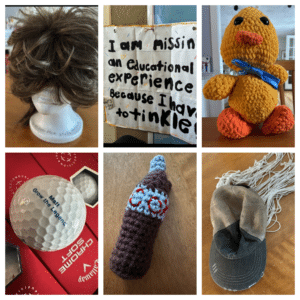Matthew Dicks's Blog, page 59
February 28, 2024
JD Salinger: Bullets, bombs, and a book
A client recently told me that he can only write at a particular time of the day and only on certain days. This was not the result of a tight schedule or the demands of work or parenting.
His brain simply doesn’t function well at specific parts of the day.
I told him that J.D. Salinger worked on “The Catcher in the Rye” while serving in World War II, carrying parts of the manuscript in his backpack while landing on the beaches of Normandy.
He continued to put pen to paper while fighting through the Hurtgen Forest, scribbling between battles.
The book was eventually published in 1951 when Salinger was 32 years old. It’s sold more than 65 million copies to date.
Only being able to write at certain times or certain days or in specific locations or with particular pens is the problem of people with no real problems.
Shut up and get to work.
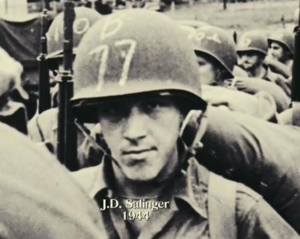
February 27, 2024
Love and hate can coexist
Is it possible to both love and hate an idea simultaneously?
Yes, it is.
A group of citizens from Valdez, Alaska, is attempting to raise $125,000 to install a life-sized bronze statue dedicated to William T. Riker, a Star Trek character who will be born in Valdez on August 19, 2335.
Riker, the first officer of the U.S.S. Enterprise, played by Jonathan Frakes on Star Trek: The Next Generation, hails from Valdez.
More specifically, he will hail from Valdez in 311 years.
This is not the first statue to be built to honor future fictional characters from Star Trek.
Captain James T. Kirk has a statue honoring him in Riverside, Iowa, and Captain Kathryn Janeway has a statue in Bloomington, Indiana.
I love the idea of these statues honoring future fictional characters.
Admittedly, I also think they’re quite stupid and despise them.
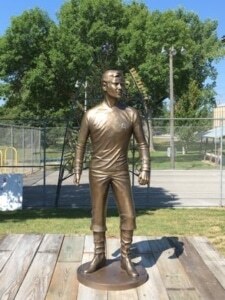
February 26, 2024
Another memory of Danny
My friend, Danny, passed away a little while back.
On Saturday, I attended his memorial service. I expressed my condolences to his children and brother and said goodbye to my friend.
On the long drive home, I thought about the one million memories we built together in the years we spent as friends. I thought about how our plan to visit our Scout camp on Alumni Day this summer would no longer happen. And I thought how much the world has lost with Danny’s passing.
Here’s another story about Danny.
Summer of 1986. Band camp. A whole week away from home as we prepare for the coming season of competition. Our marching band is serious business. In my six years in the band as a member of the drum corp (our high school included grades 7-12), we win six Massachusetts (MICA) state titles and two New England (NESBA) championships. We march in the Macy’s Day Parade, the Rose Bowl, and down Main Street at Disneyland.
Our school doesn’t yet have a football team or a football field. We are a marching band that performs halftime show routines without a halftime. We practice in a parking lot painted with the lines of a football field.
It strikes me as bizarre today, but in the 1980s, insulated by our small town, it seemed normal.
As we load our drums into the back of the band’s purple school bus at the end of practice, our band teacher starts the bus, causing its ancient engine to backfire.
One of our classmates, a member of our drum corps and our Scout troop, is leaning against the tailpipe of the bus as this happens. The heat and flame that erupt from the tailpipe blow a hole into his leg.
I’m peeing behind a building beside a fellow drummer named Greg when it happens. We hear a bang that sounds like a gunshot and then screams. A moment later, one of our classmates sprints past us.
We don’t know it, but she’s running for a phone, which is far away.
The wound is horrific, but because of the heat involved, it’s also been cauterized, so it’s not bleeding very much.
Panic had ensued. Most of the students are sent back to the mess hall. Danny and I stay behind. We know this boy well from both band and Scouts and oddly, we are two of the most equipped people to handle the situation.
Our Scout troop, run by Danny’s father, wins every competition we enter. The annual Klondike Derby and Chuckwagon Derby. Tug of war at Scout camp. First aid marathons. Knot tying contests. Fire starting races.
Danny’s father has drilled us relentlessly, and we are a troop of boys who cannot be defeated. In the words of my brother, who was also a Boy Scout at the time, “It kind of got boring winning everything.”
Standing alongside Danny and me are my drum corp captain, Tommy, and a handful of adults. One of the adults wants to put a tourniquet on the injured boy, but Danny and I know that is a mistake. He’s not bleeding badly. It’s not necessary, and it could make things worse. The adult insists on a tourniquet.
Danny and I stand between the adult and the boy, explaining why it can’t happen.
Eventually. the adults listen to us.
Instead, we take my shirt – a tee shirt emblazoned with the Worcester Polytechnical Institute logo that I had won the previous spring for faking a science project, making it to the state competition at the college, and earning an honorable mention – and wrap it around the wound lightly.
We treat the boy for shock by elevating his head and legs. We give him water.
The ambulance arrives. Paramedics place the boy inside, along with two band directors and my drum corps captain. The third band director drives the bus back. Danny and I make the long walk back to the mess hall.
We don’t say much for the walk. I’m shirtless now in the fading sun. Danny has blood on his shirt.
As the mess hall comes into view, students await the news. In a few moments, we will be inundated with questions. Before they reach us, I tell Danny that his father would’ve been proud of us today. We had spent years learning first aid, thinking our skills and knowledge would be used to defeat other Scout troops in competitions, never really understanding that it might be put to practical use someday.
Danny points out how calm we were when the adults were not. I didn’t realize it at the time, but he’s right. Danny, in fact, was the calmest of all. He actually calmed me when I felt panic rising by telling me to sit down beside the boy and talk to him.
We didn’t save the boy’s life. Had that tourniquet been put on his leg, no damage would likely been done. Even treating for shock probably did little as the ambulance soon arrived.
We didn’t do much that day, but we knew what to do and how to do it, and we knew the importance of things like assessing the situation, staying calm, making rational decisions, and preventing harm.
Danny knew all of those things best of all.
I was right that day. His father would’ve been proud.

February 25, 2024
Fourteen years later, I am still right
Fourteen years ago, Elysha and I had a disagreement over a crock pot. We had recently bought our home and were merging our belongings, and the issue of my crock pot arose.
Specifically, Elysha took inappropriate, unwarranted, and unilateral action against my beloved crock pot.
I wrote about that moment, and 5,232 days later, I revisited this moment, which is one of the beauties of writing:
You get to read about a previous time in your life, and almost instantaneously, you’re transported back, occupying that moment in your heart and mind with near-perfect clarity.
A day once lost is now returned. The past and the present collide. I revel in the days of yore.
I also get to acknowledge that fourteen years later, I’m still right, and Elysha is still wrong.
The one aspect of the story lost to time – unless Elysha remembers – is the name of the person who gave me the fabled crock pot, which is quite the mystery given her animosity toward the person (as you’ll see below).
The lesson here:
Write. Create a record of life’s most precious and even slightly precious moments. Give your future self the treasure of memory. Stop throwing away your days like they are meaningless. Cling to them. Preserve them for thousands of days later.
Had I not written about the Great Crock Pot Scandal of 2010, that moment would’ve been lost to me forever. Instead, it returns to life today, for me to enjoy, for my kids to hear, and for Elysha to finally acknowledge the error of her ways.
I’m so grateful to that previous version of myself for taking care of his future self.
Thanks, Matt. You’re the best.
UPDATE: Elysha Dicks remembers who gave me the crockpot. It was a cowardly, monstrous human being who tried and failed to do real damage to my life and career while hiding behind the pathetic curtain of anonymity.
So yeah, I guess she was right after all.
Here is what I wrote 5,232 days ago:
______________________________________________________
Elysha on Facebook: Does anyone local want a perfectly good but sort of old-school crock pot? It works totally fine but was given to my husband by someone I really don’t like, and I can’t enjoy a meal made in that thing.
Me, in response: My wife has systematically eliminated everything I initially contributed to our household. The crock pot, which I didn’t mind even though I can’t stand the person either, was one of the last hold-outs—the last vestige of my bachelorhood. I think the only thing left is a paper towel holder. I’m clinging to it with all my might.
Me again: And you know, it’s not cool just offering my crock pot to your Facebook friends. Shouldn’t I have some say in its future since it’s MINE?
Elysha: Actually, he did use it a few times this past year to make beef stew… Still, I feel no remorse about giving away his stupid crock pot.
A friend, responding with advice to Elysha: Maybe you should offer something of yours up to throw away as a peace offering.
Elysha: Um. No.
Later that night, Elysha told me that I could choose the shelter where the crock pot would be sent, but that would be the extent of my part in the decision-making process.

February 24, 2024
“Separate but equal” still alive and well in Hollywood
I’m listening to a lot of interviews in the campaign season for the Oscars:
Actors, actresses, and directors are putting their names in the zeitgeist, hoping to garner more votes.
As I’ve listened, I’ve found myself wondering:
Why are the best acting awards still divided along gender lines?
While there are athletic endeavors in which the division of the sexes seems reasonable, there is no discernable reason why actors and actresses cannot compete against one another for these professional awards.
In fact, I can’t imagine why they wouldn’t want to vie for the same award.
I would prefer my children, and my daughter in particular, to grow up in a world where they don’t see these divisions along gender lines as necessary or inevitable. I want Clara to have the opportunity to compete against men wherever and whenever there should be a level playing field, and acting would seem to be one example of this.
My friend argues that this division in awards like the Golden Globes and Oscars provides an opportunity for more awards, and therefore, more people can be recognized for their excellence. But if increased recognition is the motive for these gender-based distinctions, why not choose distinctions that matter rather than ones related solely to genitalia and chromosomes?
How about best actor in a fictional and non-fiction role?
Or best actor in a period and non-period piece?
How about best actor in an action film? Best actor in a comedy or horror movie? Maybe best actor playing the bad guy? Best actor doing their own stunts? Best actor in a biopic?
These distinctions at least seem more meaningful than best actor with a penis and best actor with a vagina, which is the distinction that we currently have.
And if we’re really interested in this division of gender to increase the number of awards, why aren’t awards like Best Director or Best Screenplay similarly divided? Women and men are required to compete against one another for the coveted directorial award, while the actors and actresses they direct do not have the same requirements.
It makes no damn sense.
Even the word “actress” provides a dilemma. While many female television and movie stars still use the term “actress” to describe their profession, a growing number now prefer to be referred to as “actors,” which makes sense.
There was a time, for example, when female comedians were referred to as comediennes, but female comics have essentially ended that stupidity. We use descriptors like firefighter, police officer, and flight attendant to eliminate gender from professional titles, and many women in Hollywood are now doing the same.
How long before the word “actress” suffers a similar, appropriate fate?
And what happens when a woman wins for Best Actress but prefers the term actor?
Does she decline?
Does she scrape the word “actress” off the statue and replace it with “actor” instead?
The whole thing is stupid.
It’s the kind of obvious, necessary, and righteous change that should be made immediately. So it probably won’t.

February 23, 2024
Meetings are terrible. Also correctable.
Data from the newsletter “8 Bits Make a Byte” from my good friends at Bedrock Data Solutions:
55 million meetings per week / 11 million per day / 1 billion per year
33% of employee’s time is spent in meetings
9% yearly increase in the number of meetings since 2000
71% of meetings are considered unproductive
Mondays have the most meetings
Wednesdays have the longest meetings
Employees report spending four hours per week preparing for meetings on average
15% of company time spent in meetings on average
All of this data means one of two things:
Companies must reduce the amount of meeting time each week.Companies must learn to run more efficient, productive, and engaging meetings.The reduction of meeting time requires a cultural change. It’s certainly possible and has been done in organizations big and small, but it’s also incredibly difficult and often takes considerable time. Cultural change requires a clear, consistent message that begins at the top and persists throughout the organization, accompanied by relentless modeling and support, consistent follow-up, positive reinforcement, and honest, accurate accountability.
Cultural change also requires leaders to acknowledge they are failing and need improvement. This can often be the biggest obstacle of all.
The second solution – learning to run more efficient, more productive, and more engaging meetings – simply requires instruction. Teach people to lead meetings more effectively, and the 71% of meetings rated unproductive will immediately decrease.
Instruction of this kind is far simpler than cultural change. It requires an awareness of a problem, a willingness to examine current performance objectively, and a desire to improve only by the people who are preparing and leading these meetings.
Also, it will require effective instruction in order to foster the changes needed, of course.
I’ve helped companies achieve both of these solutions – cultural and instructional – but I can tell you that it’s far easier for me to teach people in an organization to run better meetings than it is for me to change an organization’s culture.
As a consultant, I can directly impact the skill level of employees with relative ease. When the employees are willing to confront their need for improvement, it’s downright simple.
Conversel, I can only advise leaders about cultural change. The action required to facilitate that change must come from them.
But train a handful of people to run better meetings, and slowly, over time, people who are willing to be objective about their performance and desire to improve will start to catch on. Also, people who attend more effective meetings will begin to desire and demand them, so the likelihood of propagation increases dramatically.
The culture within the organization may not entirely shift, and there may still be pockets of ineffectiveness and resistance, but overall, meetings will improve.
The odd thing about the people who run meetings, training sessions, all-hands, and the like is this:
Almost none of them have received any instruction or training in doing the job. Their performance is based almost solely on observing others who are equally untrained, then using those ineffective methods as models for their own subsequently inept performance.
It’s like an ineffective snake eating its own ineffective tail. Only those willing to be different have a chance for greatness, and those people – the ones who dare to be different in a system that rewards conformity and uniformity – are few and far between.
This is why most meetings suck. Every previous meeting has sucked, so the only model that exists within an organization sucks, and the incentive to try something different is almost nonexistent.
If you’re a person who leads meetings, there is, according to the data, a high probability that your meetings suck. You should probably find out of this is true and do something about it.
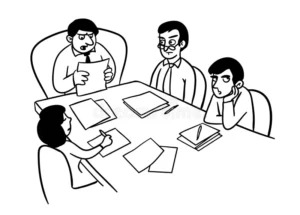
February 21, 2024
Marking my life through The Simpsons
In 1989, I was eighteen years old. I’d just graduated high school and quickly moved out (not entirely by choice) on my own. I lived in a townhouse in Attleboro, Massachusetts, with two friends. Bengi was a college student, and Tom worked in manufacturing.
I was managing a McDonald’s restaurant.
None of us had much money.
Our typical meal consisted of elbow macaroni and canned soups. We couldn’t afford to turn on the heat during our first winter, so we stayed warm by sitting on a hand-me-down couch under the same blanket.
We owned a television, which sat atop a baby changing table in the living room. It was small, even by 1989 standards.
I can still remember the night we sat down together on our hand-me-down couch and watched the first episode of The Simpsons, jazzed about this new show that we had heard so much about. We immediately fell in love with it, and for years, I hardly missed an episode.
A year later, it was so cold one night that when The Simpsons ended, no one in the room was willing to get up and change the channel (no remote back then for us), so we remained in our places and watched the next show that came on. It was Beverly Hills 90210, a program that turned out to be quite horrible but spawned a series of 90210 parties that were well attended by many friends.
The Simpsons was great, but 90210 was a bonanza for us in terms of meeting girls.
Fourteen years later, I lived in a different apartment with slightly more money and two fewer roommates. Elysha and I were on our first official date after years of friendship, though neither of us was initially sure it was a date. We spent the afternoon climbing Mount Caramel together, and on the way down, Elysha reached out and took my hand, signaling that we had moved past “just friends” status. After a bite to eat, we returned to my apartment to relax. We were sitting on my uncomfortable futon, discussing our hopes and dreams, when my future bride cut me off mid-sentence and said, “I’m sorry, but it’s six o’clock. Could watch The Simpsons?”
Any doubts that I had about our future together evaporated as the skies opened and heavenly light bathed me in happiness and joy.
Elysha liked The Simpsons. And she liked the show better than she liked talking about serious things.
A few years later, my wife and I would have another serious conversation regarding The Simpsons. This time, we found ourselves shamefully and grudgingly admitting that despite the greatness of Matt Groening’s creation, South Park may have transcended The Simpsons on the animated landscape.
It was a sad day, indeed.
But still, The Simpsons carried on, and I continued to watch.
Seventeen years later, Clara, Charlie, and I sat down to watch the first episode of The Simpsons together:
It was the same episode I had watched 31 years before in a cold apartment in Attleboro, Massachusetts.
This time, I was sitting inside a warm home on a couch Elysha and I had purchased a year before, watching on a flatscreen television mounted to the wall.
I had a remote control in my hand.
Watching that first episode with my children was a glorious moment for me. They loved the show, and a 22-minute episode ballooned into a 45-minute viewing experience as I repeatedly hit pause to teach my kids about the historical and cultural references from the show.
Every Simpsons episode, it turns out, is an opportunity to teach my children about the past, and they love it. I think I could teach a history class based solely on the content of Simpsons episodes.
The kids and I agreed only to watch new episodes together. No binge-watching allowed. The kids may rewatch episode, which they do, but they may not take a step forward unless we are all together.
Three years later, we are on season 8 of the show, originally aired in 1996 when I was starting my academic career at Trinity College and St. Joseph’s University.
The Simpsons has been on the air for 34 years, equal to the time I have spent living outside my parent’s home, taking care of myself.
So much has happened in those 34 years years:
I’ve lived in three different states, in ten different homes and apartments, and spent a period of time homeless.
I’ve earned a living as a restaurant manager, a bank manager, a salesperson, a delivery person, a wedding DJ, a teacher, an author, a columnist, a consultant, a minister, and a performer.
I’ve attended classes at six colleges, earning three degrees and a teaching certificate.
I was arrested, tried, and acquitted for a crime I did not commit.
I’ve become a husband and father.
I’ve lost my mother.
I have been teaching elementary school for 25 years. More than 550 students have made their way through my classroom door in that time.
I have published six novels and two books of nonfiction.
I’ve become a golfer, a storyteller, a comic, a corporate consultant, a playwright, a business owner, a poker player, a cat lover, and more.
With all those changes over the previous three-plus decades, it’s comforting to know that some things never change. Homer, Bart, and the Springfield gang have been around for as long as I have been living on my own. In fact, it’s about the only consistency that I have had over the past 34 years:
The Simpsons and my friend Bengi are the only two things that have remained consistent in my life since my eighteenth birthday.
So here’s to another three decades of The Simpsons and years spent watching with my kids.
Just knowing that it’s still around, still making me laugh, and connecting my past and present with such a clear thread makes me feel good.

February 20, 2024
Marathon singing with Danny
Another story about my friend, Danny, who recently passed away:
Danny and I were camping with our Boy Scout troop on an autumn weekend. We had hiked deep into the forest off a dirt road in our hometown of Blackstone with about two dozen other Scouts and our Scoutmaster (and also Danny’s father), Donald Pollock.
Danny’s older brother, Chris, was also part of the troop. Troop 1. Still exists today.
Danny and I shared a tent, and while setting it up on Friday night, Danny taught me the song “Do-Ri-Me” from “The Sound of Music.”
Doe, a deer, a female deer
Ray a drop of golden Sun
Me, a name I call myself,
Fa, a long, long way to run!
And so on…
The singing quickly annoyed Chris, whose tent was nearby, so rather than stopping, Danny and I continued to sing well into the night, knowing how much it would irritate Danny’s brother.
We must have sung that song a thousand times. We thought it was hilarious.
We had no idea how many other people we also annoyed with our late-night singing marathon.
As the sun rose, Mr. Pollock told us to pack up and hike out. The singing had kept him and others awake, and he wanted no part of us for the rest of the weekend. When I asked how we would get home, he said, “When you hit the road, turn right. Walk home. You have all day.”
Danny and I couldn’t believe it.
But it was also the mid-1980s – a time in America when punishment was real and hiking ten miles home with a backpack strapped to my body was a distinct possibility.
So we packed up our gear, took down the tent, and began a slow walk up an enormous hill in the direction of the dirt road, looking over our shoulders every few steps at the campsite – fires blazing, breakfast cooking, friends laughing – wishing we hadn’t been so stupid.
We submitted the hill and began our descent in the direction of the road. Then we heard it. “Hold on a minute!”
It was Mr. Pollock’s gravelly voice.
We turned, popped our heads over the summit, and saw Mr. Pollock, hands on hips, standing at the bottom of the hill.
“Are you ever going to be as stupid as last night?
Never, we promised.
He passed a moment as if to consider his choices and then told us to come back down the hill to camp and put our tent back up.
I have rarely felt so relieved. I missed breakfast that morning, but Mr. Pollock taught me a valuable lesson that day:
Offer children a glimpse into the future. Place them on the precipice of disaster before pulling them back. Give them a long, hard view of the potential consequences they might suffer if they do not change their ways.
Also, be crazy enough to sometimes follow through on your most outrageous threats. Making us walk home that day was an absolute possibility. Frankly, I was astounded that Mr. Pollock had changed his mind. He was a kind man, but he was tough, too, with persistently high expectations and a willingness to make things hard when necessary.
But if kids don’t believe the worst can happen, they’ll never behave like it might happen.
Mr. Pollock passed away back in 2020, and Danny’s mother, Bernadine, whom I also knew well as a boy, passed away a year later.
With Mr. Pollock’s passing, I lost a man who was as influential to me as a boy as any other human being. Donald Pollock was a tough, smart, disciplined man who loved helping boys learn to become better men.
The world is a better place because of the late Donald Pollock.
I am a better person because of him.
I don’t believe in heaven, but if there is one, I hope Mr. Pollock was standing at the top of some heavenly hill, hands on hips, a wry smile planted on his face, waiting for his son to arrive.
They both deserve a moment like that.

February 19, 2024
Danny gets me a job and changes my life
My friend, Danny, passed away recently. On Saturday, I’ll be attending his funeral.
Danny and I spent thousands of hours together as teenagers, doing what teenage boys do once they get a driver’s license and discover girls. He is one of the primary reasons I look back upon my teenage years with such fondness.
When I was feeling lost and alone, Danny appeared and saved my life.
Danny is also directly responsible for the course of my life.
When I was seventeen and Danny was sixteen, Danny decided to get a job and start earning money, and he told me to do the same. I had been working at a farm on Saturday morning, mucking stalls, loading hay, cutting fields, and the life, but I had never considered applying for a real job.
Honestly, it felt a little scary. I wondered if anyone would hire me and, if they did if I would be any good.
Danny pushed me, insisting that it was time to start working part-time and earning money so we could have more fun.
Finally, reluctantly, I agreed.
I thought of applying at White Hen Pantry, a convenience store in our hometown of Blackstone, Massachusetts, just three minutes from my home.
But Danny had discovered that the McDonald’s restaurant in Milford – ten miles north – was paying 50 cents above minimum wage:
$4.25/hour instead of $3.75/hour
I had never even been to Milford before. To my small-town sensibilities, it felt like a billion miles away.
Danny pushed me again, insisting that the money was worth the effort, so despite the distance and additional time, I agreed to drive to Milford to apply for a job. Danny and I were interviewed on the spot by the restaurant’s general manager – an intelligent, tough, no-nonsense woman named Diane Frotten – and were hired immediately.
That small decision changed my life.
I began working at McDonald’s the next day and quickly climbed up the fast food ladder, being promoted to manager while still in high school. Craving attention and validation all my life, I found a place that recognized my talent, skill, and work ethic.
For the first time, I felt surrounded by people who thought I could be something.
I was attending classes in a high school where no one had ever spoken the word “college” to me or seemed to think of me as worthy of an academic future. In fact, no one had ever spoken to me about anything after high school. I was drifting through my senior year, terrified of the future. While my classmates were counting down the days until graduation, I was dreading every moment.
But at McDonald’s, things felt differently. I was seen as someone who could run a business – manage inventory and payroll, hire and terminate employees, maintain and repair equipment, manage crew members young and old, and maintain profitability – all at the age of 17.
It was only fast food, but at the time, it was everything to me.
I met my future best friend, Bengi, two weeks later during a Saturday morning shift. Many other new friends followed, some of whom remain my friends today. I found an entirely new crew of teenage pals at McDonald’s, and my life became so much better and brighter because of it.
Two years later, Bengi and I moved in together when he decided to live off campus while attending Bryant College, and I was kicked out of my home after graduating high school.
Bengi didn’t know it then, but his offer to move in together saved my life.
When Bengi moved to Connecticut to pursue a career at Traveler’s Insurance, I was forced to stay behind. I had been arrested, jailed, and was awaiting trial for a crime I did not commit. I eventually became homeless, but when I was finally back on my feet and found not guilty, I visited Bengi in Connecticut for the weekend. We attended a Def Leppard concert, where I met a girl who would eventually bring me to Connecticut permanently.
It was here in Connecticut that I would finally make it to college, earn an English and teaching degree (while managing a McDonald’s in Hartford), find my first teaching job (the same teaching job 25 years later), and eventually meet Elysha at a faculty meeting in August of 2001.
None of this happens if Danny doesn’t propose we get jobs to pay for gas and girls.
None of this happens if Danny doesn’t drag me to McDonald’s with the promise of a larger paycheck.
None of this happens if Danny doesn’t push me into expanding my life.
Danny didn’t last long at McDonald’s. Instead, he went to work across the street at a full-service restaurant as a dishwasher. After my shift at McDonald’s, I sometimes went to his job and washed dishes for free to hang out with him.
When I graduated from high school, Danny still had a year of high school left, so we began to drift apart. I was living on my own, 30 minutes away from Danny and my hometown, and while he was still absorbed in all of the glory of a senior year of high school, I was eating elbow macaroni, struggling to heat our home, and learning to become an adult.
By the time Danny graduated high school, we were living different lives. We stayed in touch and hung out whenever we could, but that difference of a single year in age pushed us apart, and we never managed to reconnect fully.
But I often think about that drive to Milford with Danny. I often recall that interview with Diane Frotten in the side lobby of a McDonald’s that has since been replaced by an entirely new McDonald’s. I can still recall the nervousness I felt while being interviewed for the first time in my life, and I can remember – like it was yesterday – the drive back to Blackstone with Danny, blasting music from the radio in my Datsun B-210 and imagining what we would do with our first paychecks.
Danny had no idea how one tiny decision – to open the door for me to a job and a place and a new life – would change my life forever. He had no idea at the time how he was expanding my life by pushing me forward when I was still uncertain and afraid.
Years ago, while walking the trails of our former Scout camp during alumni weekend, I thanked Danny for changing my life.
He tried to downplay his role, but I didn’t allow it. We need people in our lives who push us forward, challenge our boundaries, and expand our possibilities. Danny did that for me in 1987, so I told him how grateful I was to him.
I should’ve thanked him a thousand times more.
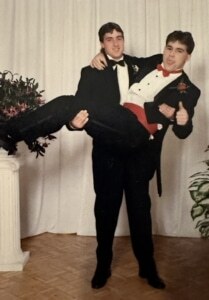
February 18, 2024
Birthday surprises from little-ish people
I celebrated my birthday three days ago, and it was quite a day, filled with lots of celebration and fun.
Elysha, the kids, and I went to our favorite diner for dinner for burgers, shakes, and cake.
My colleagues brought me lunch and a Carvel ice cream cake – my favorite food in the world.
A former colleague returned to school to deliver me a birthday gift and say hello.
Lots of people wished me well in real life and online.
But it was the gifts given to me by students that really stood out. They included:
A 1980s-styled wig – designed to highlight my less-than-robust head of hair.
A poster-sized bathroom pass inspired by a Far Side cartoon, reading, “I am missing an educational experience because I have to tinkle.”
Overuse of the restroom, extended use of the restroom, and poor timing of restroom usage are all plagues of fifth grade.
“Nothing good ever happens in a room full of toilets!” is one of my constant refrains.
A stuffed duck, crocheted by hand by a student (which took hours to make), alongside a blank, handmade birth certificate allowing me to choose the name and gender of my duck.
I’m still thinking. Suggestions welcomed.
A crocheted bottle of Diet Coke.
A hat with string attached to the back to look like hair – again highlighting my less-than-robust head of hair.
Golf balls stamped with the phrase, “Grow the legend, Matt,” which is something my friend Scott advises me to do when playing golf.
Scott – an outstanding golfer who played in high school and college – believes in playing smart golf unless you have the opportunity to do something ridiculous but unforgettable. On those rare occasions, you should throw caution to the wind and attempt the shot, as foolish as it may be, to “grow the legend.”
This gift of golf balls was given by a former colleague whom I introduced to the game a couple of years ago after retiring and is now obsessed.
The gifts were hilarious, heartfelt, and deeply appreciated, but the cards and notes written by students meant just as much. I constantly, relentlessly tell my students about the power and meaning of the written word, and they have clearly been listening and did not disappoint. Their cards were masterpieces of wit and wisdom, kindness and cruelty, and everything in between. They touched my heart while stabbing me in the back. Complimented me in one sentence while insulting me in the next. They made me laugh out loud at their hilarity and brought tears to my eyes with their sweetness.
“You still have more energy than all of us at 53! Happy birthday, little man!”
“You have many different qualities. Some I admire. Some I despise.”
“You are very weird. Crazy in many ways. A big meanie. But sometimes you can be inspiring. Different in a good way.”
“Thank you for teaching me so much and being my friend, but remember, every birthday brings you closer to death.”
“Happy birthday, you pain in the butt. I mean that in a mostly good way.”
I’m often asked why I still teach with so many other career opportunities available to me.
“Why teach when you’re doing so many other things already?” was something I was asked just yesterday in an interview.
This is why.
